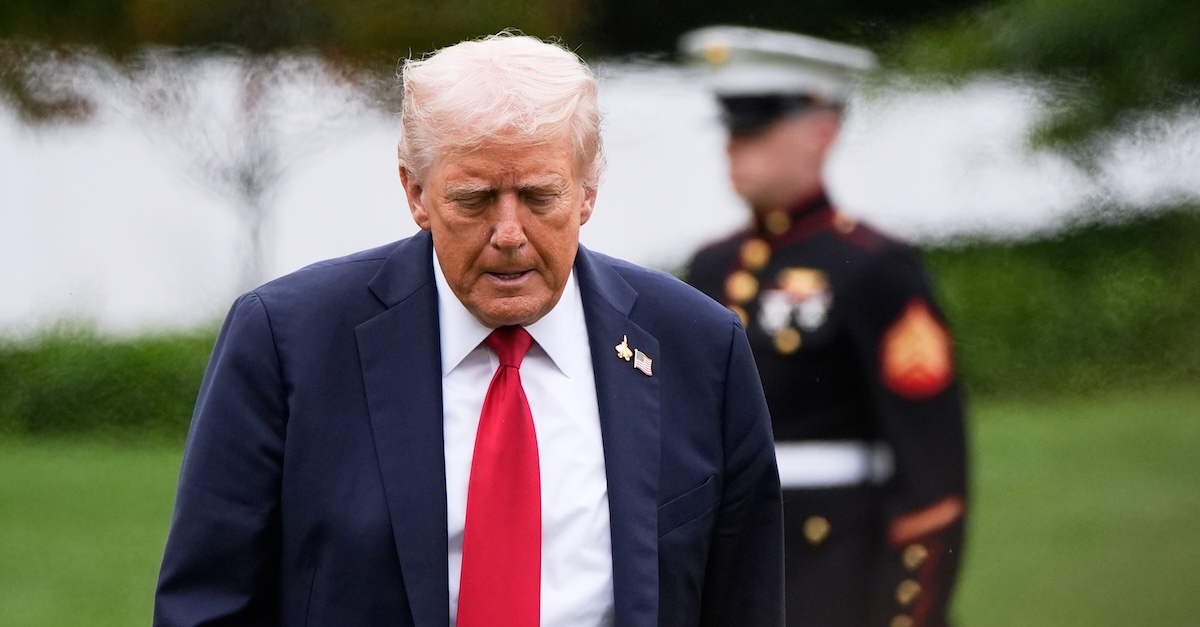
President Donald Trump walks from Marine One after arriving on the South Lawn of the White House, Tuesday, Sept. 30, 2025, in Washington (AP Photo/Alex Brandon).
After a tumultuous twist of fate last week, the Trump administration has issued a mea culpa in one of the ongoing legal battles over the federal use of state National Guard troops to police American cities.
On Monday, in a letter motion addressed to the clerk of court for the U.S. Court of Appeals for the 9th Circuit, the U.S. Department of Justice admitted that multiple prior representations about federal deployments to Portland, Oregon, were "incorrect" and expressed "regret" for making numerous such "errors" in various court filings.
Early last week, a three-judge appellate panel, in a 2-1 ruling, stayed a temporary restraining order (TRO) issued by U.S. District Judge Karin Immergut, an appointee of President Donald Trump during his first term in office. That TRO barred "the federalization and deployment of Oregon National Guard service members."
Late last week, after the Beaver State alerted the court to those aforementioned errors, the full 9th Circuit administratively stayed the panel's own stay – "[w]ithout objection from the panel."
Love true crime? Sign up for our newsletter, The Law&Crime Docket, to get the latest real-life crime stories delivered right to your inbox.
While the full court was clear that its pause of the panel's pause was "not a reconsideration of the earlier stay order," the latest-in-time order came in response to Oregon's arguments regarding the now-admittedly incorrect numbers supplied by the federal government.
To hear Oregon tell it, "central" to the panel's stay was a claim by the government that anti-deportation "protests had forced the redeployment of 115 Federal Protection Service officers, 'nearly 25% of FPS officers nationwide,' to Portland."
But those numbers were substantially exaggerated.
In discovery produced last Wednesday, the DOJ "admitted that 115 FPS officers have never been redeployed to Portland." Rather, the Beaver State says, "[o]nly a fraction of that number was ever in Portland at any given time before the President's directive."
Citing four separate time frames, the discovery revealed deployments of 27 officers, 31 officers, 29 officers, and 20 officers in Portland at any given time between mid-June and the end of October.
The federal government's Monday filing clarifies the apparent source of those numbers – while taking responsibility for the mistake.
"Defendants do wish to correct a factual discrepancy discovered in the course of responding to plaintiffs' letter," DOJ wrote in its Monday filing. "We are informed by our clients that this 115 figure was the number of deployments and that some individuals were deployed multiple times. Based on DHS's review of the deployment data, the number of individual FPS officers deployed during the time period appears to be 86 officers."
In other words, the Trump administration says it simply confused the number of deployments with the number of people deployed.
The DOJ's Monday letter motion also contains an additional bit of record correction about the relevance of those overstated claims.
From the filing, at length:
Relatedly, we stated in our supplemental brief that "it is undisputed that nearly a quarter of the agency's entire FPS capacity had to be redirected over a relatively short period to a single location in one medium-sized American city due to the unrest there." This statement was incorrect. The statement was intended to reference the percentage of inspectors who had been deployed to Portland during the relevant period, since inspectors are the FPS personnel whose primary mission is to patrol and respond to law enforcement incidents at federal buildings. But in addition to relying on the 115 figure—which as noted above, actually consisted of 86 unique individuals—some of the 86 deployed FPS officials…are not inspectors. Based on the agency's records, it appears that 65 of the 86 individuals deployed to Portland were inspectors. The statement should be corrected to reflect that approximately 13.1 percent of the agency's inspectors had to be redirected to Portland during the period discussed…
That is, the Trump administration now says its earlier claims about needing to redirect "nearly a quarter" of one agency's staff are being abandoned in full. Rather, the federal government now claims slightly over 13% of one subset of the agency in question – the FPS – was redirected to deal with anti-deportation protests in Portland.
Additionally, however, the DOJ takes issue with the upshot of these errors and their saliency in terms of the earlier panel stay.
The motion argues that Oregon's own attorneys "contend" the Trump administration "misled the Court into thinking that all or most of those 115 officers were deployed to Portland at the same time and throughout the entirety of the relevant period."
Not so, says the federal government.
"[D]efendants never contended that all FPS officers were deployed at the same time or remained in Portland throughout the relevant period," the motion goes on. "Nor did defendants' counsel represent otherwise at oral argument. Although defendants regret any unintended ambiguity about the number of deployed FPS officers at any given time, there is no basis for concluding that any such ambiguity was the basis for the majority's decision."
In sum, the DOJ admitted its errors, but insisted they were not intended to mislead and that, to the extent they did mislead, those misrepresentations did not actually convince the panel of anything.
And, in closing, the Trump administration sticks to its guns.
"Defendants' declarations explain in detail why the surge of FPS personnel in response to violence and unrest is unsustainable," the letter motion concludes. "But defendants take with the utmost seriousness their obligation to provide the Court with accurate and up-to-date information, and we deeply regret these errors."
Comments